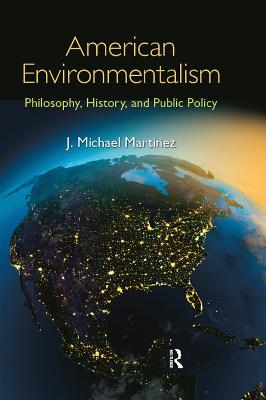
American Environmentalism
Routledge (Verlag)
978-1-4665-5970-7 (ISBN)
The book delves into key normative concepts that undergird American perspectives on nature by providing an overview of philosophical concepts found in the western intellectual tradition, the presuppositions inherent in neoclassical economics, and anthropocentric (human-centered) and biocentric (earth-centered) positions on sustainability. It traces the evolution of attitudes about nature from the time of the Ancient Greeks through Europeans in the Middle Ages and the Renaissance, the Enlightenment and the American Founders, the nineteenth and twentieth centuries, and up to the present. Building on this foundation, the author examines the political landscape as non-governmental organizations (NGOs), industry leaders, and government officials struggle to balance industrial development with environmental concerns.
Outrageous claims, silly misrepresentations, bogus arguments, absurd contentions, and overblown prophesies of impending calamities are bandied about by many parties on all sides of the debate—industry spokespeople, elected representatives, unelected regulators, concerned citizens, and environmental NGOs alike. In lieu of descending into this morass, the author circumvents the silliness to explore the crucial issues through a more focused, disciplined approach. Rather than engage in acrimonious debate over minutiae, as so often occurs in the context of "green" claims, he recasts the issue in a way that provides a cohesive look at all sides. This effort may be quixotic, but how else to cut the Gordian knot?
J. Michael Martinez began his career in the private practice of law. He later earned a Ph.D. in political science and a second Ph.D. in public administration. Martinez’s scholarly work has appeared in numerous academic publications, including Administration & Society; The American Review of Public Administration; The Georgia Historical Quarterly; The Journal of Environment & Development; The Journal of Medicine and Philosophy; The Journal of Policy History; Nonprofit Management & Leadership; Politics & Policy; and The South Dakota Law Review, among others. He also has co-edited and contributed chapters to three academic texts: Ethics and Character: The Pursuit of Democratic Virtues (Carolina Academic Press, 1998); Confederate Symbols in the Contemporary South (University Press of Florida, 2000); and The Leviathan’s Choice: Capital Punishment in the Twenty-first Century (Rowman & Littlefield, 2002). He has written three books on Southern history: Life and Death in Civil War Prisons (Rutledge Hill Press, 2004), a selection of the History Book Club; Carpetbaggers, Cavalry, and the Ku Klux Klan: Exposing the Invisible Empire During Reconstruction ( Rowman & Littlefield, 2007); and Coming for to Carry Me Home: Race in America from Abolitionism to Jim Crow (Rowman & Littlefield, 2012). His other books include Administrative Ethics in the Twenty-first Century (with William D. Richardson; Peter Lang Publishers, 2008), Public Administration Ethics for the Twenty-first Century (Praeger, 2009), and Terrorist Attacks on American Soil: From the Civil War Era to the Present (Rowman & Littlefield, 2012). Since 1992, Martinez has worked in the Government Affairs & Environment Department at Dart Container Corporation, a leading manufacturer of disposable foodservice products. During the 1990s, he taught political science at Georgia State University and environmental law at Atlanta’s John Marshall Law School. He now teaches political science, criminal justice, and public administration courses as a part-time faculty member at Kennesaw State University, the University of South Dakota, and the University of Georgia, respectively. From 1988 until 1992, he was on the staff of the Southern States Energy Board, a non-profit interstate compact organization that researches energy and environmental laws and regulations
Philosophical Foundations of Environmentalism. General Philosophical Ideas and Concepts. Neoclassical Economics. The Range of Philosophical Concepts in Environmental Ethics. Historical Foundations of Environmentalism. Pre-American Attitudes about the Natural Environment. The Enlightenment and the American Founders. The Nineteenth Century. The Twentieth Century. Modern Environmental Politics. Environmental Interest Groups. Modern Sustainability. Conclusion: Where Do We Go From Here?
| Zusatzinfo | 21 Illustrations, black and white |
|---|---|
| Verlagsort | New York |
| Sprache | englisch |
| Maße | 156 x 234 mm |
| Gewicht | 748 g |
| Themenwelt | Naturwissenschaften ► Biologie ► Ökologie / Naturschutz |
| Sozialwissenschaften ► Politik / Verwaltung ► Staat / Verwaltung | |
| Technik ► Umwelttechnik / Biotechnologie | |
| ISBN-10 | 1-4665-5970-5 / 1466559705 |
| ISBN-13 | 978-1-4665-5970-7 / 9781466559707 |
| Zustand | Neuware |
| Haben Sie eine Frage zum Produkt? |
aus dem Bereich


